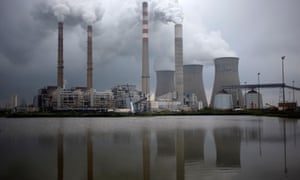https://www.theguardian.com/environment/2017/apr/03/switch-from-nuclear-to-coal-fired-power-linked-to-low-birth-weight-in-us-region-tennessee-valley
Children in a region of the US were born smaller after the area switched from nuclear plants to coal-fired power stations, new research has found.
The study looked at of the impact of nuclear power plant closures in the aftermath of the Three Mile Island accident in Pennsylvania in 1979 – the most serious such accident in US history – in which one of the power station’s reactors underwent a partial meltdown.
“At the time policymakers thought they were protecting public health by scrutinising nuclear power plants, given the partial meltdown that happened in Three Mile Island,” said Edson Severnini, author of the research from Carnegie Mellon University in the US. “But they didn’t anticipate this indirect effect that happened through the relocation of electricity generation from nuclear to coal.”
While the study is based on a historical incident, experts say the results are pertinent given the shift from nuclear to coal power in Japan and Germany following the Fukushima accident in 2011, and the eagerness of the Trump administration to embrace coal.
Writing in the journal Nature Energy, Severnini describes how he sought to analyse a so-called “natural experiment” whereby a number of nuclear power plants were closed following country-wide inspections carried out after the Three Mile Island accident. Among them were Browns Ferry and Sequoyah in the Tennessee Valley area: both remained closed for several years after they were shut down in 1985.
The analysis of data from the US Energy Information Administration by Severnini reveals that the loss of nuclear energy following the two closures was made up almost entirely by an increase in energy production by coal-fired power plants in the Tennessee Valley area, although the increase varied across different plants.
The result was that particle pollution increased in areas where coal use rose. Around the Paradise plant, which accounted for almost a quarter of the rise in coal-fired energy, concentration of particulates increased by 27% in the 18 months after the nuclear shutdown.
At the same time average birth weight fell. After taking into account a host of factors relating to the child, county and mother, including her age and education levels – although smoking habits were not specifically probed – birth weight in areas with coal-fired plants declined by around 5.4% in the 18 months after the nuclear shutdown. The impact was greatest in the areas which showed the greatest boom in coal-fired power plant activity after closure of the two nuclear sites.
With previous research suggesting that air pollution could affect both the health of pregnant women and their unborn babies, Severnini carried out further analysis of the data, revealing that the rise in air pollution appears to be linked to both lower growth of the foetus and premature births. What’s more, he adds, the impact on birth weight only appears to occur in babies born at least three months after the nuclear shutdown.
“If the mother is exposed only in the last three months of pregnancy it could be that the formation of the foetus is already advanced and then the effects might be lower – which is what I find,” he said.
But the impact, adds Severnini, goes further, with lower birth weights linked to lower incomes, shorter height and even a lower IQ: a drop of 5.4% in birth weight, he notes, suggests a 0.7% decrease in full-time earnings.
Jonathan Griggs, professor of paediatric respiratory and environmental medicine at Queen Mary University of London, who was not involved in the research, said the study chimes with previous research showing the impact of air pollution and traffic on birth weight. “What makes it interesting is it is a natural experiment,” he said of the latest research.
The study, he adds, could also have important implications for the US, with the Trump administration pledging to expand the coal industry. Marie Pederson from the Center of Epidemiology and Screening at the University of Copenhagen agreed.
“I think we have enough evidence to say we should not shift to coal-burning power plants, and really it could be good to push for more clean energy sources, not only for birth weight but for many other outcomes also,” she said, pointing out that air pollution has been linked to respiratory diseases such as asthma as well as health problems in pregnant women, including hypertension and pre-eclampsia.
While exactly how air pollution acts on the foetus is unclear and requires further research, said Griggs, but he added the latest findings are troubling. “If you have reduced organ development, both brain and other organs, our concern is that has a disproportionate effect over the whole lifespan,” he said. “What we want as clinicians, we want to maximise foetal development and anything that suppresses foetal development in any way is of concern.”
Hello again …
… today we have a small favour to ask. More people than ever are regularly reading the Guardian, but far fewer are paying for it. Advertising revenues across the media are falling fast. And unlike many news organisations, we haven’t put up a paywall – we want to keep our journalism as open as we can. So we think it’s fair to ask people who visit us often for their help. The Guardian’s independent, investigative journalism takes a lot of time, money and hard work to produce. But we do it because we believe our perspective matters – because it might well be your perspective, too.'
If everyone who reads our reporting, who likes it, helps to support it, our future would be much more secure.

沒有留言:
張貼留言